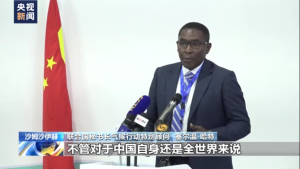The U.S. midterm elections were held on the 8th, with a tight race and a lot of “money” on the line. According to the U.S. political donations database, the non-partisan organization “Open Secrets” website, the cumulative cost of the 2022 federal and state elections is expected to exceed $16.7 billion, making it the “most expensive” midterm election in U.S. history.

The election is crucial for both Republicans and Democrats and will affect the political environment for the next two years and even the presidential election in 2024. In the current economic downturn, the stock game dominates US politics and the competition for socio-economic resources is so fierce that both parties and their supporters are trying to throw their weight around and “buy” themselves “options” to influence future government decisions by making additional bets. According to an article in The Economist, there is a long-term trend for US elections to become increasingly “expensive”, with partisan rivalries making politics more of a “zero-sum game” and therefore the “stakes” placed by interest groups and individual donors The “stakes” for interest groups and individual donors will also be higher.
Social cleavages are an important factor in driving up the “price” of elections in the US. The divide between rich and poor, political polarisation, identity politics and other factors have led to conflicts of interest and fissures in groups everywhere. Epidemics, abortion, gun control, infrastructure, public debt and other legislation relating to all aspects of the economy and people’s livelihoods have become the arena and bargaining chips for party competition. If a party used to buy ads on ten policy issues to influence voters, now it may have to spend ads on twenty or more issues, and the ad spending on some key issues may increase exponentially. According to NPR, the Democrats are spending nearly 20 times as much on ads on abortion issues this year as they did in the 2018 midterms.
In addition, the reckoning of the two parties turning on each other has also cost a lot of money. For example, Republican governors in Texas, Arizona, and Florida have bused or flown tens of thousands of immigrants who are in the country illegally to some Democratic-dominated cities in the Northeast with the aim of attacking the Democratic Party by hyping the immigration issue in order to boost Republican support; then again, Democrats have spent more than $50 million to fund rival Republican contenders in party contests because they believe these The Democrats spent more than $50 million to fund their opponents’ Republican contenders in the party contest because they thought these people would be easier to defeat than other Republicans in a bipartisan showdown. …… All of this is a “black hole” for money.
It can be argued that the “money” game between the Democratic and Republican parties is as intense as the “political distance” between Americans. According to a poll by the Pew Research Center, a US think tank, 90% of US respondents believe that there are serious differences between supporters of different parties, and nearly 60% of US respondents believe that people not only disagree in policy areas, but also find it difficult to reach consensus on some basic facts. In America today, “I’m an American” is being replaced by “I’m a Republican” and “I’m a Democrat”. “Sheila Krumholz, executive director of the Open Secrets website, said that compared to four years ago, this year’s U.S. midterm elections are not only more politically divisive, but also “burn” more fierce, and the surge in campaign spending has in turn increased the polarization of American politics.
The election investment is getting bigger and the threshold for participation is getting higher, which undoubtedly excludes more participants and creates a breeding ground for the wealthy class to manipulate money politics, pushing American political inequality to the extreme. According to the Washington Post, 91% of US congressional seats are won by candidates with financial backing, with big business, the super-rich and the interest groups that represent them being the main sources of election funding. These so-called “representatives of the people” are often elected to serve the interests of their owners rather than to speak out for the people. As one US Senator once noted, “Some people think that the US Congress controls Wall Street, but the truth is that Wall Street controls the US Congress”.
The increasingly “expensive” elections have left the public deeply disappointed with the so-called “democratic politics” under the control of money. According to an Associated Press poll, 8 out of 10 people in the US are unhappy with their government. Former US President Jimmy Carter has publicly stated in a television interview that democracy, which requires huge amounts of money, is “irreversibly damaging” to the US political system. Former President Barack Obama has admitted that there is “too much money involved in politics” in the US. Money politics permeates all aspects of elections, legislation and governance, the people’s right to participate in politics is greatly restricted, economic inequality is transformed and solidified into political inequality, which in turn exacerbates economic inequality, and the so-called “American democracy” built on money, if it can be called democracy at all, has long been alienated into The so-called “American democracy”, if it can be called a democracy at all, has already been transformed into a “money-master” politics of “one percent owns, one percent governs and one percent enjoys”.

